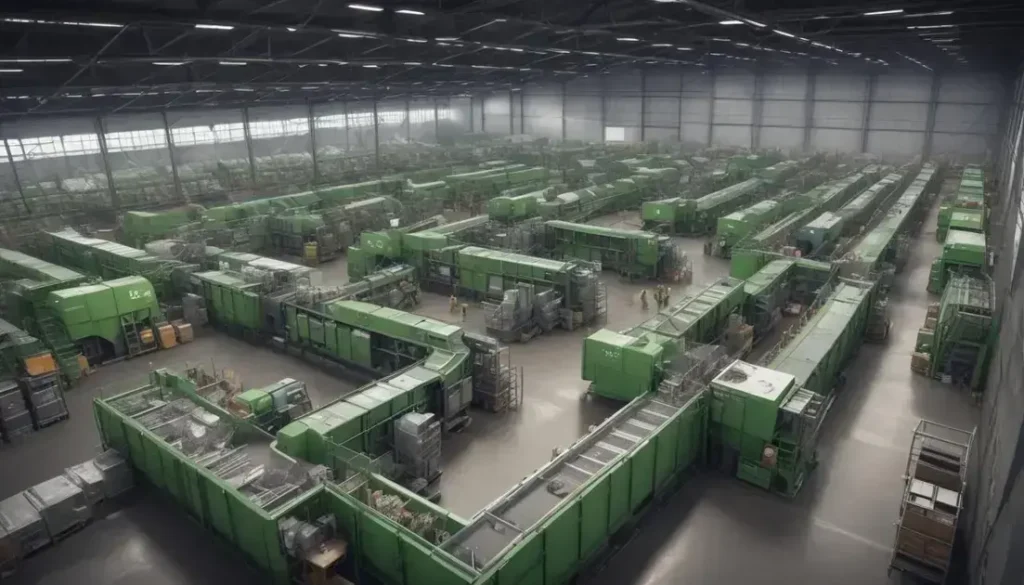Australian exporters can benefit from forming strong partnerships, staying compliant with regulations, embracing technology, prioritising sustainability, and investing in employee training to navigate global market challenges effectively.
Sustainability is becoming a cornerstone for businesses worldwide. DP World’s latest financial results and environmental efforts showcase how sustainability and profitability can go hand in hand, especially for Australian exporters.
Introduction to DP World’s sustainability journey
DP World is committed to integrating sustainability into all aspects of its operations, setting a new benchmark in logistics. By investing in green technologies, they aim to reduce carbon emissions significantly across their supply chain. The company’s initiatives include using renewable energy sources and enhancing energy efficiency in their facilities.
Innovations in logistics play a vital role in DP World’s sustainability strategy. They are implementing automated systems that optimise resource use, reducing waste and increasing operational efficiency. This not only lowers costs but also minimises the environmental footprint of their global operations.
Moreover, DP World actively engages with local communities to promote environmental awareness and responsible resource management. They collaborate with stakeholders to ensure that their sustainability goals align with community needs and expectations. This dual focus on environmental stewardship and business efficiency is crucial for securing their position as a leader in sustainable trade.
Through these efforts, DP World demonstrates that sustainability is not merely a compliance issue but a pathway to innovation and long-term success in the logistics sector. Their journey reflects a broader trend of integrating sustainable practices at the core of business strategies, aiming to inspire peers across the industry.
Key financial achievements of DP World
DP World has consistently demonstrated strong financial performance, with significant growth in key areas. The company reported a remarkable increase in revenue, attributed to its expanding portfolio of services and global reach. This growth is bolstered by strategic investments in infrastructure and technology.
Profit margins have also improved, reflecting the efficiency of operations and cost management strategies. By optimising their logistics processes, DP World effectively reduces operational costs, enhancing overall profitability.
One notable achievement is their commitment to sustainable growth. By aligning financial goals with environmental initiatives, DP World has not only satisfied regulatory requirements but also improved their market position. This dual focus on profits and sustainability attracts investors and strengthens brand loyalty.
Additionally, DP World has diversified its revenue streams, reducing dependency on traditional shipping operations. The expansion into terminal operations and solutions for supply chain efficiencies has positioned them favourably in the competitive logistics landscape.
As a result, DP World has established itself as a leader in the industry, showcasing that robust financial health and sustainability efforts can coexist and drive long-term success.
Sustainability agenda as a growth driver
The sustainability agenda has emerged as a vital growth driver in the logistics industry, particularly for companies like DP World. By prioritising sustainability, they not only enhance their operational efficiencies but also attract environmentally conscious clients and investors.
One crucial component of this agenda is the commitment to reducing carbon emissions. DP World implements eco-friendly practices, such as using renewable energy sources in their terminals and optimising shipping routes to lower fuel consumption. These actions not only contribute to their sustainability goals but also result in cost savings over time.
Moreover, DP World’s innovative approach to sustainability fosters brand loyalty among customers who value environmental responsibility. This commitment positions them as leaders in the competitive logistics landscape, opening new business opportunities.
Investing in sustainability also helps in mitigating risks associated with regulatory compliance and climate change. By adopting proactive measures, DP World can navigate challenges more effectively and secure its long-term viability.
As a result, the sustainability agenda not only drives growth through operational improvements but also enhances DP World’s overall market competitiveness. This multifaceted approach ensures that sustainability remains at the forefront of their corporate strategy.
Impact of global operations on local exporters
Global operations have a profound impact on local exporters, shaping their strategies and market positioning. For companies like DP World, facilitating international trade is crucial to the success of Australian exporters. By providing enhanced logistics solutions, they enable local businesses to access global markets more efficiently.
Supply chain optimisation is a core focus for DP World. The seamless integration of local and global operations helps reduce lead times and costs. This optimisation is pivotal for exporters looking to remain competitive in a fast-paced, international environment.
Moreover, local exporters benefit from the sharing of best practices and technologies that arise from DP World’s extensive global network. By leveraging these advancements, they can improve their operational efficiencies and product offerings. This collaboration enhances their ability to meet international standards, crucial for success in foreign markets.
However, global operations can also present challenges for local exporters. Exposure to fluctuating international market conditions and regulatory changes can impact profitability. By understanding these dynamics, exporters can develop strategies to mitigate risks and capitalise on potential opportunities.
Ultimately, the relationship between global operations and local exporters is symbiotic. As DP World continues to expand its capabilities, local businesses are empowered to thrive and succeed on the global stage.
Investment in renewable energy
Investment in renewable energy is a cornerstone of DP World’s sustainability initiatives. The organisation understands that transitioning to greener energy sources not only reduces carbon emissions but also enhances operational efficiency. By integrating renewable energy into their logistics framework, they set a leading example in the industry.
DP World has made significant strides in utilising solar power and wind energy across its facilities. These clean energy sources provide a sustainable alternative to conventional energy, significantly lowering utility costs and environmental impact. Furthermore, such investments align with global goals to combat climate change.
Through partnerships with renewable energy providers, DP World is developing innovative solutions that enhance energy efficiency. This collaboration fosters advancements in energy storage technologies, enabling the company to manage energy use more effectively during peak demand periods.
The financial benefits of investing in renewable energy are evident. Not only do these initiatives contribute to a greener footprint, but they also attract environmentally conscious clients and investors, enhancing DP World’s reputation globally. By prioritising renewable energy, the company not only positions itself as an industry leader in sustainability but also ensures long-term viability amid evolving market trends.
Emissions reduction initiatives
DP World is at the forefront of emissions reduction initiatives, demonstrating a strong commitment to sustainability within the logistics sector. By adopting advanced technologies and practices, the company aims to significantly lower its carbon footprint across global operations. These efforts are crucial not only for regulatory compliance but also for meeting the expectations of environmentally conscious consumers.
One strategy involves the implementation of energy-efficient systems in their terminal operations. Upgrading equipment and optimising energy usage leads to substantial reductions in greenhouse gas emissions. Additionally, DP World is investing in alternative fuels and technologies, such as electric vehicles in their handling processes, further transitioning towards greener operations.
Collaborative efforts with shipping partners are also essential in their emissions reduction strategy. By working together, they aim to improve the efficiency of transportation routes and reduce overall fuel consumption. This collaborative approach not only benefits DP World but also strengthens the sustainability initiatives of its partners, creating a ripple effect across the industry.
Furthermore, DP World actively monitors and reports on its emissions data, allowing for greater transparency and accountability. This commitment to tracking progress ensures they remain proactive in achieving their sustainability targets and reinforces their role as a leader in promoting environmental responsibility within the logistics sector.
Integrated logistics and supply chain solutions
Integrated logistics and supply chain solutions are pivotal to the success of DP World, enabling them to enhance operational efficiency and provide superior service to customers. By combining various elements of logistics into a cohesive strategy, DP World ensures seamless movement of goods across global networks.
A key feature of their approach is the use of advanced technologies such as artificial intelligence and big data analytics. These technologies help in monitoring shipments in real-time, optimising routes, and foreseeing potential disruptions in the supply chain. By addressing issues proactively, DP World can maintain the flow of goods without unnecessary delays.
Furthermore, DP World fosters strong partnerships with local and international logistics providers, which significantly enhances their service offerings. This collaboration allows for flexibility and adaptability in a constantly changing market landscape. By providing tailored solutions, DP World can meet the specific needs of various industries, from agriculture to manufacturing.
Training and development of staff in these integrated solutions also play a crucial role. By equipping employees with the necessary skills and knowledge, DP World ensures that they are well-prepared to handle complex logistics challenges. This commitment to excellence not only drives efficiency but also strengthens customer satisfaction.
Role of technology in sustainability
The role of technology in sustainability is vital, particularly for companies like DP World. By leveraging cutting-edge innovations, they enhance operational efficiencies while minimising their environmental impact. This integration of technology drives sustainability initiatives in logistics and supply chain management.
One significant aspect is the use of data analytics. Advanced analytics allows DP World to monitor energy consumption and greenhouse gas emissions in real-time. By identifying inefficiencies, the company can implement targeted strategies to reduce waste and optimise resource usage. This data-driven approach not only improves sustainability but also contributes to cost savings.
Furthermore, technologies such as automation and AI play critical roles in streamlining operations. Automated systems increase speed and accuracy in logistics processes, resulting in lower energy use and reduced emissions. For example, automated vehicles and machinery in terminals enhance throughput while limiting reliance on non-renewable energy sources.
The implementation of smart grids and renewable energy technologies also supports DP World’s sustainability efforts. By investing in solar and wind energy, the company can power operations with cleaner energy, further reducing their carbon footprint. This commitment not only aligns with global sustainability goals but also positions DP World as a leader in the logistics sector.
Community engagement initiatives
Community engagement initiatives are a fundamental aspect of DP World’s operational ethos. The company recognises that fostering strong relationships with local communities is vital for sustainable success. By actively involving community members in their projects, DP World enhances social cohesion and builds trust.
One notable initiative is the collaboration with local educational institutions. DP World partners with schools and universities to provide training programs and internships, fostering skills development among young people. These educational initiatives not only empower individuals but also contribute to the local workforce’s overall competency, aligning with DP World’s long-term growth strategy.
Additionally, DP World engages in environmental stewardship programs aimed at promoting sustainability within the community. Activities such as tree planting and clean-up drives are regularly organised, encouraging community members to participate actively in preserving their local environment. These initiatives highlight the company’s commitment to reducing its ecological footprint while strengthening community ties.
Through open communication and partnership with local stakeholders, DP World ensures that community needs and concerns are addressed effectively. Regular community forums and feedback sessions facilitate dialogue, allowing residents to express their opinions and help shape the company’s initiatives. This ongoing engagement is instrumental in reinforcing the company’s reputation as a socially responsible leader in the logistics sector.
Future outlook for sustainability in logistics
The future outlook for sustainability in logistics is promising, as companies like DP World continue to innovate and adapt to changing environmental demands. As global awareness of climate change increases, there is a growing push for the logistics sector to adapt its practices to be more eco-friendly and energy-efficient.
One key trend is the increasing integration of renewable energy sources into logistics operations. Companies are expected to invest more heavily in solar and wind energy to power warehouses and transport vehicles. This shift not only reduces carbon emissions but also decreases dependence on fossil fuels, thus enhancing energy security.
Moreover, advancements in technology will play a critical role in shaping sustainable logistics. Innovations such as electric vehicles and automated delivery systems can significantly lower emissions while improving efficiency. As these technologies become more affordable and accessible, their adoption will likely accelerate across the sector.
Collaboration among stakeholders is essential for driving sustainability initiatives forward. By forming partnerships, logistics companies can share best practices, streamline operations, and reduce waste. The focus on circular economy principles will also gain traction, encouraging industries to rethink supply chains and product lifecycles.
Overall, the logistics industry is poised to embrace sustainability as a fundamental operational pillar, paving the way for a greener and more responsible future.
Challenges faced by DP World
DP World faces several challenges in its ongoing commitment to sustainability and operational excellence. One of the primary issues is navigating the complexities of global supply chain disruptions. Events such as natural disasters, geopolitical tensions, and pandemics can significantly impact logistics operations, causing delays and increasing costs.
Another challenge is the need for continuous innovation in a rapidly evolving industry. As technology advances, DP World must invest in new systems and processes to stay competitive while also ensuring these innovations align with sustainability goals. This requires a delicate balance between embracing new technologies and managing operational costs.
Regulatory compliance is also a significant concern. DP World operates in multiple jurisdictions, each with its own regulations regarding environmental standards, trade practices, and safety protocols. Maintaining adherence to these varying regulations while striving for efficiency can strain resources.
Furthermore, attracting and retaining skilled talent is crucial for DP World’s success. The logistics sector is experiencing a labour shortage, particularly in high-skilled areas such as technology and operations management. To overcome this challenge, DP World must invest in employee training and development to enhance workforce capabilities.
Addressing these challenges is essential for DP World to maintain its leadership position while achieving its sustainability objectives.
Regulatory implications for Australian businesses
The regulatory landscape in Australia presents both challenges and opportunities for businesses, particularly in the logistics sector. Compliance with environmental regulations is increasingly critical as the government pushes for sustainable practices. Companies like DP World must adapt their operations to meet strict standards aimed at reducing carbon emissions and promoting environmental sustainability.
Failure to comply with these regulations can lead to significant penalties and damage to reputation. Therefore, understanding the regulatory implications is essential for maintaining operational integrity. Companies are often required to invest in technological upgrades and sustainable processes to comply with evolving laws.
Moreover, new trade regulations and tariffs can impact international logistics operations. As Australia strengthens its trade relationships, businesses must remain agile and informed about changes in trade agreements and tariffs that influence supply chains. This necessitates fluid communication between stakeholders to adapt quickly to regulatory shifts.
Lastly, businesses must pay attention to safety regulations that govern operations and worker safety. Strict adherence to these laws is essential to reduce risks and ensure a safe working environment. Regular training and updates on compliance practices are necessary for personnel at all levels.
Ultimately, being proactive in understanding and managing regulatory implications can provide Australian businesses with a competitive edge, fostering resilience and innovation in an ever-changing market.
Conclusion and takeaways for Australian exporters
Australian exporters face a dynamic landscape influenced by various global and local factors. To thrive, they must focus on strategic partnerships and collaborations, leveraging connections with logistics providers and stakeholders. Building strong networks can enhance market access and supply chain efficiencies, ultimately benefiting their export activities.
Understanding the evolving regulatory environment is also crucial. Compliance with both local and international regulations ensures smooth operations and fosters trust with customers. Exporters should stay informed about changes in trade agreements and environmental policies that might affect their businesses.
Moreover, investing in technology is becoming increasingly important. Embracing digital tools can streamline processes and provide valuable data insights into customer preferences and market trends. By adopting innovative technologies, Australian exporters can enhance their competitiveness in the global market.
Sustainability is another key consideration. As global demand for environmentally friendly practices grows, exporters who prioritise sustainable operations are likely to attract more customers and improve their brand reputation. Implementing sustainable practices can also lead to cost savings in the long run.
By focusing on these takeaways—collaboration, regulatory awareness, technological advancement, and sustainability—Australian exporters can navigate challenges effectively and seize opportunities in the global marketplace.
In Summary: Key Strategies for Australian Exporters
Australian exporters operate in a challenging but rewarding environment. By focusing on forming strong partnerships, staying updated on regulatory changes, and embracing innovative technologies, businesses can position themselves for success.
Additionally, prioritising sustainability will not only meet market expectations but also enhance brand reputation. These elements are crucial for navigating the complexities of global trade.
Through careful consideration of these factors, Australian exporters can overcome obstacles and seize new opportunities in the international marketplace. This proactive approach will enable them to thrive and maintain a competitive edge.
Frequently Asked Questions
How can Australian exporters benefit from forming strong partnerships?
Strong partnerships enhance access to resources and networks, allowing exporters to navigate market challenges more effectively.
What are the key regulations Australian exporters should be aware of?
Exporters should stay informed about environmental regulations, trade agreements, and safety standards that might impact their operations.
Why is technology integration important for exporters?
Integrating technology streamlines processes, provides valuable data insights, and helps exporters remain competitive in the global market.
How can sustainability practices benefit Australian exporters?
Sustainable practices can improve brand reputation, attract environmentally conscious customers, and lead to long-term cost savings.
What role does employee training play in achieving export goals?
Employee training enhances skills and ensures teams are equipped to meet compliance standards and embrace technological advancements.
How can Australian exporters adapt to global market changes?
By being flexible and proactive in their strategies, exporters can respond swiftly to changes in demand, regulations, and supply chain dynamics.


